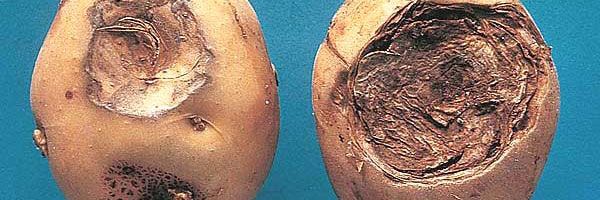Phoma spp.
Phoma exigua var. exigua - Phoma exigua var. foveata
(Gangrene)
- Causal agent and transmission
Gangrene is a dry rot of tubers mainly caused by the fungus Phoma exigua var. foveata (the most aggressive type) or by the species P. exigua var. exigua.
These fungi survive in the soil as saprophytes. Infected soil adhering to the tuber acts as a propagator of the fungus, which, at harvest, contaminates the tuber surface through wounds.
Storage areas and equipment can also be sources of contamination.
- Significance
Gangrene, as well as dry rot due to Fusarium spp., has a significant economic impact in cold or temperate climates such as in Northern Europe. Once potato production becomes mechanised and relies on machinery for harvesting, handling and grading, the incidence of the disease may increase.
Inadequate storage conditions will increase the incidence and severity of the disease. For seed potato production, this fungal group may be a significant cause of quality degradation.






